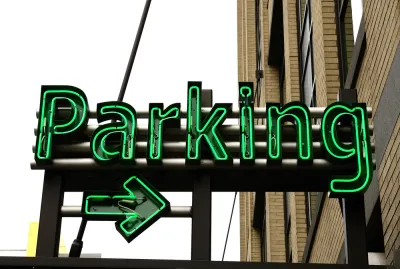Dynamic pricing is not the only route to increasing parking availability. Better management of disabled placards at metered spaces may be an easier and more effective strategy. Implemented on July 1, Portland's policy is showing dramatic results.

The new policy is simple: owners of disabled parking placards are treated like non-disabled motorists, i.e. pay to park, though they can park for a longer period. The one exception to the payment policy is for wheelchair users who are distinguished by a different type of placard. [See time chart and placard distinction on the Portland Bureau of Transportation website.]
Steven DuBois of the Associated Press explains that what drove Portland to make the policy change was the lack of available parking and the disproportionate number of disabled parking placards occupying downtown spaces.
An AP survey on Thursday (July 10) and Friday afternoon found over 50% parking vacancy on a busy downtown street. When they surveyed the street last year, parking vacancy was zero. AP was not the only one to notice the dramatic change.
"I was amazed on July 1," parking code enforcement officer Becky Rhodes said. "I thought there would be more of a transition period, but people just stopped. They were gone."
Perhaps the publicity on the policy change accounts for the sudden parking availability. Notices were placed on vehicles displaying disabled placards informing them of the new policy prior to the change.
Portland is not the first to do away with the handicapped placard privilege. Philadelphia and Raleigh, North Carolina already do it, writes DuBois.
For an interesting policy discussion on the merits of considering this policy change, the University of California Transportation Center released their report last year by Michael Manville and Jonathan Williams, accessible here.
"Manville and Williams aren't arguing that we should abolish disabled parking all together. Rather, they argue that there's no good reason to make it free, and plenty of reasons not to."
Actual reports on how the Portland policy change affects parking availability is expected in the fall after the city surveys all downtown parking spaces.
If those with non-wheelchair, disabled person placards fail to pay the meter or observe their extended time limits, they are subject to the same $60 violation that others must pay, writes DuBois.
DuBois doesn't mention whether the policy change was influenced by parking revenue considerations.
FULL STORY: Portland parking eases; free disabled parking ends

Analysis: Cybertruck Fatality Rate Far Exceeds That of Ford Pinto
The Tesla Cybertruck was recalled seven times last year.

National Parks Layoffs Will Cause Communities to Lose Billions
Thousands of essential park workers were laid off this week, just before the busy spring break season.

Retro-silient?: America’s First “Eco-burb,” The Woodlands Turns 50
A master-planned community north of Houston offers lessons on green infrastructure and resilient design, but falls short of its founder’s lofty affordability and walkability goals.

Test News Post 1
This is a summary

Analysis: Cybertruck Fatality Rate Far Exceeds That of Ford Pinto
The Tesla Cybertruck was recalled seven times last year.

Test News Headline 46
Test for the image on the front page.
Urban Design for Planners 1: Software Tools
This six-course series explores essential urban design concepts using open source software and equips planners with the tools they need to participate fully in the urban design process.
Planning for Universal Design
Learn the tools for implementing Universal Design in planning regulations.
EMC Planning Group, Inc.
Planetizen
Planetizen
Mpact (formerly Rail~Volution)
Great Falls Development Authority, Inc.
HUDs Office of Policy Development and Research
NYU Wagner Graduate School of Public Service


























